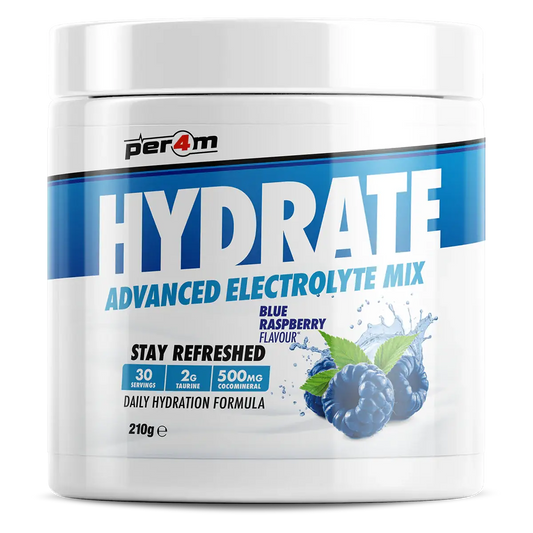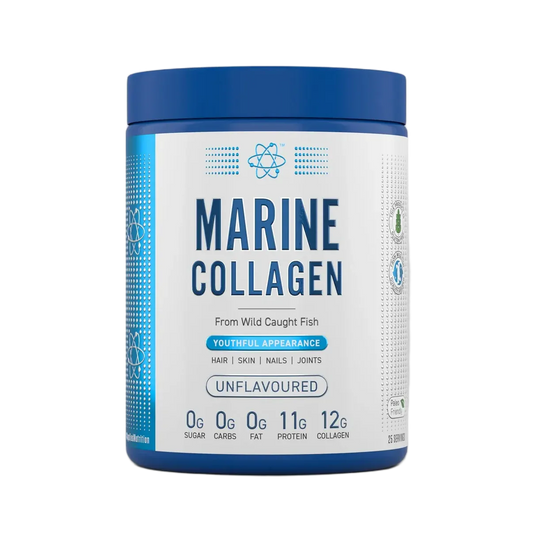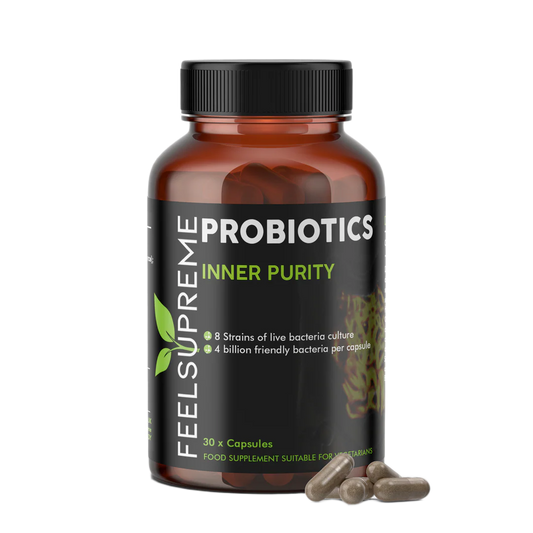Gym people talk about protein, creatine, electrolytes, sleep, and macros…
But almost no one talks about skin.
Until it becomes a problem.
The combination of sweat, friction, heat, tight clothing, bacteria-filled equipment, hot showers, stress, caffeine, dehydration, and rapid nutrient turnover makes active people far more prone to breakouts, dullness, dryness, redness, and inflammation.
You’re doing everything right for your body — lifting, running, pushing, sweating — but your skin ends up paying the price.
Here’s the part no one tells you:
Healthy skin is a nutrient game.
And the more active you are, the faster you burn through the nutrients your skin desperately depends on.
In Part 1, we look at the vitamins, minerals, proteins, and micronutrients that keep active people glowing, resilient, hydrated, and clear — even when training intensity is high, sweat is constant, and recovery windows are short.
Let’s get into it.
1. What Vitamins Help Strengthen Skin?
Skin isn’t just a surface. It’s a living barrier made of protein, lipids, water, and minerals — all constantly regenerating. Vitamins play a direct role in every one of those steps.
The most important skin-strengthening vitamins are:
-
Vitamin C: builds collagen, supports healing, reduces inflammation.
-
Vitamin A: supports skin turnover and smoothness.
-
Vitamin E: antioxidant protection from sweat, UV, and pollution.
-
Vitamin B-Complex: supports energy, stress response, and moisture balance.
-
Vitamin D: influences inflammation, immune function, and skin clarity.
Active people lose vitamins B, C, and electrolytes through sweat, meaning the more you train, the more your skin needs.
This is exactly why a complete formula like Applied Nutrition Multi-Vitamin Complex works beautifully as a foundation. It replenishes the nutrients consistently drained during training, keeping the skin stronger, smoother, and more resilient under stress.

2. How Can I Improve My Skin Naturally?
Great skin doesn’t come from fancy serums alone — it comes from inside.
If you want long-term, stable improvement, these internal habits matter far more:
Hydration → the skin’s most underrated “treatment”
Sweating strips water and minerals from your skin barrier. Without replenishment, you get:
-
dullness
-
tightness
-
small dehydration lines
-
more redness
-
increased oil production (ironically)
This is where a hydration product becomes more than a gym supplement.
Per4m Hydrate helps restore electrolytes, sodium-potassium balance, and fluid movement — all crucial for plump, fresh, healthy-looking skin.
Healthy fats → the glow factor
Healthy skin cells need Omega 3 fats to stay flexible, hydrated, and calm.
Supplement Needs Omega 3 is one of the most impactful additions someone can take for skin clarity and softness.
Collagen → structure and elasticity
Skin is made of collagen. So when collagen breaks down faster than you rebuild it (e.g., intense training, sun exposure, stress), you lose firmness.
Applied Nutrition Marine Collagen helps restore that balance.
Gut health → where skin begins
If your gut is inflamed, stressed, or unbalanced, it will show on your skin.
Feel Supreme Probiotics play a direct role in clearing hormonal breakouts, reducing inflammation, and strengthening the skin barrier.
Naturally improving skin is easier than people think — you just have to support the systems beneath the surface.
3. What Nutrient Deficiency Causes Poor Skin Health?
The most common deficiencies that show up in skin are:
-
Vitamin C → slower healing, dullness, more redness
-
Omega 3 → dryness, increased breakouts, poor barrier function
-
Zinc → acne, slow wound healing, irritation
-
B Vitamins → oil imbalance, inflammation, fatigue showing on the face
-
Collagen loss → thinning, sagging, fine lines
-
Vitamin D → inflammation and compromised barrier strength
The issue?
Active people are more likely to be deficient in most of these because:
-
sweat drains electrolytes and B vitamins
-
intense training increases oxidative stress
-
high protein diets may reduce intake of fruits/veg
-
frequent showering strips oils
-
gym stress increases inflammation
-
indoor training limits Vitamin D production
This is why a combination of Multi-Vitamin Complex, Marine Collagen, Omega 3, and Probiotics becomes such a powerful foundational routine.
Your skin can’t perform if it’s running on empty.
4. Which Nutrients Make Your Skin Glow?
There is a real biological formula behind “glowing skin,” and it’s not skincare marketing — it’s blood flow, hydration, antioxidant capacity, and collagen support.
The nutrients that genuinely create that glow are:
-
Omega 3: gives skin its bounce and healthy sheen.
-
Collagen peptides: tighten and smooth the surface.
-
Vitamin C: brightens and supports new collagen fibres.
-
Antioxidants: protect the skin barrier from sweat and bacteria.
-
Electrolytes: restore plumpness and hydration lost during training.
-
B Vitamins: give the face a fresher, energised look.
-
Probiotics: reduce inflammation, helping skin appear clearer and calmer.
Glow is basically a sign of nutrition + circulation + hydration working together, and active people tend to lose all three during training. Replenishing them becomes the key to getting that healthy, resilient look — even if you train daily.

5. What Ingredients Help Achieve “Glass Skin”?
Glass skin is about smoothness, even texture, hydration, and internal calm.
The internal nutrition components that influence this look include:
-
Collagen peptides → structural smoothness
-
Omega 3 → plump, hydrated, flexible skin cells
-
Vitamin C → brightness and tone evenness
-
Zinc → blemish control
-
Probiotics → hormonal and inflammation regulation
-
Electrolytes → the water retention inside the cells
Applied Nutrition Marine Collagen is one of the most skin-transformative products you stock — and paired with Omega 3, the improvement in texture and smoothness is extremely noticeable.
When you support collagen, hydration, and inflammation all at once, you get the kind of skin quality that even skincare products can’t fake.
6. How Important Is Diet for Clear Skin?
Diet is everything. Especially for active people.
Why?
Because the more you train, the more you oxidise nutrients, damage skin cells, and deplete hydration. Skin reflects internal stress faster than any organ.
Diet influences:
-
collagen formation
-
inflammation
-
oil production
-
immune responses to bacteria
-
hormonal fluctuations
-
gut health
-
hydration balance
Most skin problems in active people come from:
-
dehydration
-
micronutrient insufficiency
-
poor gut health
-
high sugar intake
-
overconsumption of stimulants
-
lack of healthy fats
-
high cortisol from intense training
Diet won’t fix everything, but it determines the “baseline condition” of the skin.
Supplements fill the gaps left by training-induced nutrient losses — which is why they become essential tools for people who sweat regularly.
7. Can Drinking More Water Improve Your Skin?
Water helps — but not on its own.
Dehydration absolutely affects skin:
-
it looks flatter
-
pores look deeper
-
lines appear more noticeable
-
skin becomes more reactive
-
redness increases
BUT… skin hydration is not just about water.
It’s about electrolytes.
Without minerals, water can’t get inside your skin cells.
That’s why many people drink water all day and still have dry skin.
Per4m Hydrate solves this.
It restores sodium, potassium, magnesium, and essential minerals that allow water to actually enter and hydrate tissues.
Think of electrolytes as the key that unlocks hydration.
8. What Vitamin Keeps You Energetic and Active?
Vitamin B12 is the one most people know, but “energy” isn’t about one nutrient — it’s about the entire B-complex, iron status, electrolyte balance, and Omega 3 intake.
Active people often feel tired not because they lack motivation, but because their micronutrients are too low for their training volume.
Here’s the reality:
When you’re micronutrient-deficient, it shows on your skin first… and your energy second.
That’s why Applied Nutrition Multi-Vitamin Complex is important — it covers the B vitamins and minerals you burn through while training.
And when your energy is stable, your skin looks consistently better too.

9. What Supplements Are Best for Tiredness and Low Energy?
From a skin-health perspective, low energy equals high inflammation — and high inflammation equals breakouts, roughness, redness, and slower healing.
The supplements that address both energy and skin quality are:
-
Omega 3 → improves inflammation and cognitive energy
-
Multi-Vitamin Complex → restores B-vitamins, magnesium, zinc
-
Probiotics → reduces digestive fatigue and improves absorption
-
Per4m Hydrate → improves fluid-based energy
-
Marine Collagen → supports physical and skin recovery
You’ll notice all five of your chosen products fit this crossover perfectly.
Because what drains your energy also drains your skin.
Intermission — Why Active People Are More Prone to Skin Issues
Here’s the big truth no fitness influencer talks about:
Exercise stresses your skin.
Not in a bad way — movement is essential for health — but the reality is:
-
sweat increases bacterial exposure
-
friction breaks the skin barrier
-
heat increases inflammation
-
tight clothing traps bacteria
-
showers strip oils
-
training increases oxidative stress
-
cortisol spikes influence breakouts
-
dehydration flattens the skin
The fitter you are, the more your skin needs help.
That’s why the combination of Omega 3, Marine Collagen, Multi-Vitamin Complex, Per4m Hydrate, and Probiotics is specifically powerful for active people.
Each one targets a different mechanism of skin stress — from hydration and inflammation to collagen and gut balance.
10. Do Active People Need More Vitamins or Nutrients?
Yes — without question.
Active people lose far more micronutrients than sedentary individuals because exercise increases:
-
sweat loss
-
oxidative stress
-
inflammation
-
metabolic turnover
-
nutrient-dependent tissue repair
-
collagen breakdown
-
electrolyte usage
Most people only think about protein and carbs post-workout, but the micronutrient cost of training is enormous.
Every time you sweat, you lose:
-
sodium
-
potassium
-
magnesium
-
zinc
-
B vitamins
-
fluid needed for skin hydration
Every time you train, you also use:
-
vitamin C for collagen formation
-
Omega 3 for inflammation regulation
-
antioxidants for cellular protection
-
amino acids for tissue repair
This is why active people can experience skin issues even when eating well.
The demand is simply higher.
And it’s why the combination of Multivitamin, Omega 3, Marine Collagen, Hydration, and Probiotics creates a uniquely effective “active skin support stack.”
11. How Does Sweat Impact Skin Health?
Sweat itself isn’t the problem — in fact, sweat is healthy.
The problem is what comes with sweat:
-
increased salt on the skin
-
bacteria from gym surfaces
-
trapped moisture under clothing
-
pore dilation
-
friction
-
reactive oil production
-
pH imbalance
When sweat sits on the skin too long, it can cause:
-
breakouts
-
rashes
-
redness
-
dry patches
-
irritation
-
clogged pores
But the deeper issue is internal:
Sweating drains electrolytes and B vitamins, which are essential for maintaining healthy oil balance and hydration inside the skin.
This is why products like Per4m Hydrate and Applied Nutrition Multi-Vitamin Complex make a difference not just in performance — but in skin clarity and consistency.
Hydrated, mineral-balanced skin is resilient skin.

12. Can Omega 3 Improve Skin for Active People?
Absolutely — Omega 3 is one of the most powerful skin nutrients available.
It improves:
-
hydration
-
elasticity
-
inflammation control
-
barrier strength
-
redness reduction
-
acne severity
-
sensitivity and irritation
-
overall smoothness and softness
Active people burn through anti-inflammatory nutrients faster due to training load.
This means your skin is more prone to irritation, dryness, and redness unless you support it.
Supplement Needs Omega 3 provides the high-EPA and DHA fatty acids your skin uses to stay flexible, calm, and healthy even when you’re sweating and training regularly.
This is often the supplement people feel most quickly in their skin — a difference in glow, softness, and inflammation within weeks.
13. How Does Collagen Help Active People Maintain Clear, Firm Skin?
Training puts microscopic stress on your skin — heat, friction, and pressure all contribute to collagen breakdown. Combine that with high cortisol from intense exercise, and collagen naturally declines faster.
Applied Nutrition Marine Collagen works on multiple levels:
-
supports elasticity
-
reduces the appearance of fine lines
-
improves firmness
-
enhances hydration retention
-
accelerates skin repair from sweat and friction
-
strengthens hair and nails (huge for female athletes)
What makes collagen so powerful for active people is this:
You’re constantly breaking down collagen via training stress — so supplementing it creates a visible difference quicker than you’d expect.
Marine collagen has a smaller particle size than bovine collagen, meaning faster absorption and stronger skin benefits.
14. Does Gut Health Really Affect Skin Clarity?
Yes — profoundly.
The gut–skin axis is one of the most researched areas in dermatology.
When your gut is inflamed, unbalanced, or stressed, your skin shows it in the form of:
-
breakouts
-
redness
-
dullness
-
slower healing
-
unpredictable oil production
-
increased sensitivity
Active people often struggle with gut imbalance due to:
-
high protein intake
-
artificial sweeteners
-
stress hormones
-
caffeine
-
irregular eating patterns
-
dehydration
This is why Feel Supreme Probiotics fits perfectly into a skin-health blog.
By improving gut balance, reducing inflammation, and supporting digestion, probiotics improve skin clarity from the inside out.
You’ll see this especially in people who struggle with:
-
hormonal acne
-
stress breakouts
-
redness
-
poor digestion
-
low immunity
-
inflamed skin
Healthy gut → calmer skin.
Every time.
15. Do Electrolytes Help With Skin Hydration?
Electrolytes aren’t just for lifters — they’re essential for your skin.
Cells need electrolytes to hold water. Without them, water passes straight through the body instead of hydrating tissues. This is why people can drink litres of water yet still have dry skin.
Per4m Hydrate helps replenish sodium, potassium, magnesium, chloride, and other minerals that enable the skin to retain moisture properly.
Effects you can see:
-
plumper skin
-
fresher appearance
-
reduced fine dehydration lines
-
more even tone
-
softer texture
Skin hydration is not about moisturiser.
It’s about internal water movement — and electrolytes control that.
16. Do Active People Get More Skin Breakouts?
Yes, for several reasons:
-
sweat mixes with bacteria
-
gym equipment harbours microbes
-
heat increases oil production
-
tight clothing traps sweat
-
stress hormones spike
-
frequent showers strip natural oils
-
dehydration flattens the skin barrier
A nutrient routine actively reduces breakouts by supporting:
-
oil balance (Omega 3 + B vitamins)
-
inflammation control (Omega 3)
-
healing (Vitamin C + collagen)
-
barrier strength (hydrolysed collagen + probiotics)
-
hydration (electrolytes)
This internal approach is more effective and longer lasting than overusing harsh cleansers, which often damage the barrier and worsen breakouts.

17. Do Active People Age Faster?
Surprisingly, yes — if they don’t protect their skin.
Exercise itself doesn’t age you — in fact, it’s anti-aging.
But the environment around an active lifestyle accelerates aging:
-
UV exposure (outdoor running)
-
oxidative stress from training
-
dehydration
-
sweating
-
friction
-
inflammation
-
frequent hot showers
-
poor sleep from high cortisol
-
high caffeine use
This is why active people often see early signs of aging on their skin:
-
fine lines
-
dryness
-
redness
-
collagen loss
-
pigmentation
-
dullness
But… you can reverse this pattern quickly by supporting the skin with the nutrients it loses most.
This is where your product stack works beautifully:
-
Marine Collagen for firmness
-
Omega 3 for softness and flexibility
-
Multi-Vitamin Complex for antioxidant protection
-
Probiotics for inflammation control
-
Per4m Hydrate for plumpness
Skin ages when the barrier is weak.
Nutrient support keeps it strong.
18. How Do You Build a Skin-Friendly Supplement Routine?
For active people, the best skin stack is simple and effective:
-
Morning:
-
During Training:
-
Evening:
This routine tackles:
-
hydration
-
inflammation
-
collagen loss
-
micronutrient turnover
-
gut balance
-
tissue repair
Most people see visible improvements in:
-
glow
-
texture
-
clarity
-
smoothness
-
firmness
-
hydration
within 2–4 weeks.
Conclusion — Beautiful Skin Starts Inside, Especially for Active People
Active people have some of the most unpredictable skin:
-
clear one week
-
stressed the next
-
glowing after a rest day
-
inflamed after sweat-heavy sessions
-
dry after cardio
-
breakout-prone after stress
-
dull when under-recovered
This inconsistency isn’t a skincare issue — it’s a nutrient issue.
Your skin is fighting to keep up with:
-
sweat
-
friction
-
bacteria
-
dehydration
-
cortisol
-
oxidative stress
-
heat
-
training load
When you give it Omega 3, collagen, electrolytes, antioxidants, and probiotics, you’re not just “supporting skin” — you’re giving the body the materials it needs to maintain healthy, calm, glowing skin while you stay active.
The goal isn’t perfection.
It’s stability.
Skin that doesn’t freak out when you train.
Skin that doesn’t collapse under sweat and heat.
Skin that handles the gym environment with resilience and calm.
This is where your chosen stack shines.





